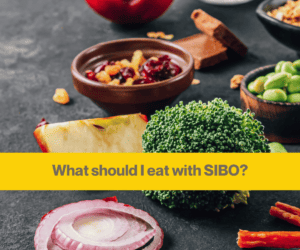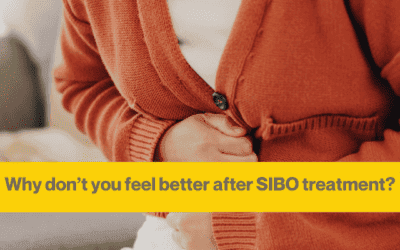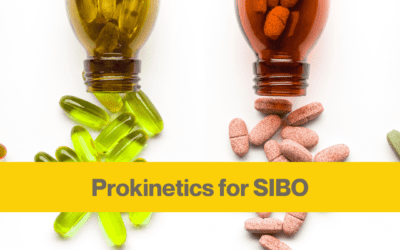Could SIBO be driving your gut symptoms?
As a SIBO nutritionist I work with people who have an overgrowth of bacteria in their small intestine.

If you’re exhausted by researching SIBO, or trying to find a practitioner who actually understands it, I can help!
For anyone new to SIBO, here’s a quick intro:
SIBO, or small intestine bacterial overgrowth, occurs when bacteria, which normally live in your large intestine, get into your small intestine. There they ferment food that we’ve eaten, and create gasses which affect our intestines.
This can lead to symptoms such as bloating, diarrhoea and gas, but also all sorts of other symptoms like headaches, joint pain and skin conditions.
You might have heard of SIBO whilst looking for solutions to for Irritable Bowel Syndrome. Small Intestinal Bacterial Overgrowth has only relatively recently been researched and discovered. Many doctors still even aren’t familiar with the symptoms or treatment.
There is a growing body of research papers that are investigating treatment and prevention using conventional and natural methods.
Why is SIBO a problem?
The large number of bacteria in the small intestine causes health problems because these microbes:
- ferment starches and carbohydrates from your food in your small intestine, causing excess gas, bloating, diarrhoea or constipation. For an overview of the difference in bloating caused by lactose intolerance and SIBO see my other article.
- create a defensive structure called a biofilm around themselves. This helps to guard them because they are in the inhospitable environment of the small intestine, but makes it harder for us to treat.
- can interfere with nutrient absorption, leading to nutrient insufficiency
- may increase your sensitivity to food through reduction in the brush border enzymes.

How to know if you have SIBO
Some clues you might have SIBO include:
- You feel worse when you eat prebiotic foods or supplements (inulin, beans, onions, garlic)
- Sugar alcohols such as xylitol (often used in diet foods) makes your symptoms worse
- Symptoms worsen with probiotic use, potentially because this may be adding to the overgrowth of bacteria
- Fibre increases constipation symptoms
- You feel better on antibiotics
- You’ve had previous episodes of food poisoning that seemed to kick start your symptoms.

Risk factors for SIBO
There are three types of potential causes for SIBO
- Motility changes – this leads to impaired cleaning of the small intestine, resulting in more bacteria growing
- Any reduction in the natural antibiotic nature of our digestive tract such as reduced stomach acid, or a reduction in the Migrating Motor Complex may lead to an overgrowth in microbes.
- If you have a slow transit time there is more change the bacteria can start to cling to the walls of the small intestine. This means food is hanging out in the small intestine longer than it should, and bacteria get a chance to cling on and grow.
- Structural changes – slowing the passage of food through the gut through strictures, adhesions or scarring in and around the small intestines.
- Anyone who has had a breach in the natural digestive defence systems is at risk of SIBO. This could be surgery such as appendectomy, laparoscopy, or C-Section because this may either bring in outside microbes, or cause scarring or adhesions which slow down the gut motility.
- Reduced natural defences – lack of proper defence such as impaired stomach acid production, bile acid flow, or reduced digestive enzymes.
- Those who take medication to prevent stomach acid working are also at risk (e.g. Gaviscon, Omeprazole, sometimes called proton pump inhibitors (PPIs). As we age the stomach acid can also get weaker, which reduces the amount of protection it can give against incoming pathogens.
Read more about the risk factors for SIBO in this longer blog post.
How to diagnose SIBO
It’s important to rule out any other diagnoses so working with your GP to ensure they have completed any medical investigations they need to do. Most GPs won’t be familiar with SIBO, but a gastroenterologist may be able to test you. I can organise a SIBO breath test as part of my 1:1 coaching work, but as these are paid for privately you may wish to ask your NHS doctor about a test as well.
To find out if you’ve got it, SIBO is diagnosed with a breath test. This helps to identify if you are creating too much hydrogen or methane in your intestines.
Treatment for SIBO
If you have a positive test there are several options for supporting SIBO. The best antibiotic for SIBO is Rifaxamin but this isn’t available on the NHS, only prescribed by private GPs in the UK. It’s well tolerated and has fewer side effects than other antibiotics.
- Natural anti-microbials are also available in the form of herbs that work like oregano, berberine, grapefruit seeds.
- A low FODMAP diet for a short amount of time may help because it will starve the bacteria in the small intestine. This reduction in microbe numbers can give you a break in symptoms, but it doesn’t treat SIBO. Read more about what to eat with SIBO in this blog post. A low carb / FODMAP diet should reduce the symptoms like bloating and pain after eating, but it won’t necessarily get rid of the overgrowth of bacteria.
- Digestive enzymes can support your body to break down food to make it easier to absorb the nutrients and prevent.
- Sometimes if the anti-microbial supplements or antibiotics don’t work agents to break up the biofilms make help to weaken the microbes in the small intestine.
- Lifestyle changes are also recommended to ensure you’re getting enough sleep, and movement of your body
Recovering from SIBO
- Probiotics (beneficial bacteria taken as a supplement) are not normally used in the early stages of SIBO, but as recovery takes place,
- Other supplements to support gut healing can be useful to care for the lining of the small intestine after the microbes have been killed off.
- Ideally you want to get back to eating as broad a diet as you can, with as much variety in fibre and nutrients.
Contact me if you have digestive issues you want to address. I can help you find a SIBO diet that works for you and your body. Email me on info@goodnessme-nutrition.com.
How I can help you as a SIBO Nutritionist
I work with people who have IBS, SIBO, or unexplained bloating, constipation, gas or loose stools. As part of the Gut Reset I will
- Assess your digestive symptoms, but also look at mood, skin health, sleep, weight, muscle / joint pain and other relevant symptoms
- Support you to find a diet that relieves the bloating, pains and gas
- Arrange for SIBO testing at home and help you understand the results
- Define a supplement plan for the 3 month Gut Reset programme and afterwards.
- Help you implement the dietary changes with recipe ideas and meal plans, as well as understanding nutrition better so you can create your own meal plans.
- Support you to eat a wider diet variety, reintroducing your eliminated foods again
- Support you with regular calls so you really understand what to focus on each week.
Work with me - IBS & SIBO Nutritionist
Book a free call to talk about working with me
What’s the best SIBO diet for treating and getting rid of symptoms?
What to eat when you have SIBO If you've got SIBO you might be desperately searching for what to...
8 reasons you don’t feel any better after SIBO treatment
Small Intestinal Bacterial Overgrowth is very tricksy kind of condition, so it's common to try a...
How to use prokinetics in SIBO
This post will help explain the function, and benefits of using a prokinetic and how it can affect...


